
Rasipuram Krishnaswami Iyer Narayanaswami, better known as R. K. Narayan, was an Indian writer and novelist known for his work set in the fictional South Indian town of Malgudi. He was a leading author of early Indian literature in English along with Mulk Raj Anand and Raja Rao.
Malgudi is a fictional town located in Agumbe situated in the Shivamogga district of the Indian state of Karnataka in the novels and short stories of R. K. Narayan. It forms the setting for most of Narayan's works. Starting with his first novel, Swami and Friends, all but one of his fifteen novels and most of his short stories take place here. Malgudi was a portmanteau of two Bengaluru localities - Malleshwara and Basavanagudi.

Swami and Friends is the first of a series of novels written by R. K. Narayan (1906–2001), English language novelist from India. The novel, the first book Narayan wrote, is set in British India in a town called Malgudi. The second and third books in the trilogy are The Bachelor of Arts and The English Teacher.

The English Teacher is a 1945 novel written by R. K. Narayan. It is a part of a series of novels and collections of short stories set in "Malgudi". The English Teacher was preceded by Swami and Friends (1935), The Bachelor of Arts (1937) and Malgudi Days, (1943) and followed by Mr. Sampath – The Printer of Malgudi.

A Tiger for Malgudi is a 1983 novel by R. K. Narayan told by a tiger in the first person. Deeply moving is the attachment of the tiger to the monk and the monk's care for the tiger. R. K. Narayan consulted with noted tiger expert K. Ullas Karanth on the writing of this novel. Narayan used the teaching of Buddha's enlightenment in this particular novel. The novel is set in the fictional town of Malgudi.

The Vendor of Sweets (1967), by R. K. Narayan, is the biography of a fictional character named Sri K. V. Jagan who is a sweet vendor of Malgudi. The story beautifully reflects his conflict with his estranged son and how he finally leaves for renunciation, overwhelmed by the sheer pressure and monotony of his life.
Indian English literature (IEL), also referred to as Indian Writing in English (IWE), is the body of work by writers in India who write in the English language but whose native or co-native language could be one of the numerous languages of India. Its early history began with the works of Henry Louis Vivian Derozio and Michael Madhusudan Dutt followed by Rabindranath Tagore and Sri Aurobindo. R. K. Narayan, Mulk Raj Anand and Raja Rao contributed to the growth and popularity of Indian English fiction in the 1930s. It is also associated, in some cases, with the works of members of the Indian diaspora who subsequently compose works in English.

Ji (transl. Emperor) is a 2005 Indian Tamil-language political action film written and directed by N. Lingusamy and produced by S. S. Chakravarthy. The film stars Ajith Kumar and Trisha in the lead roles and the music is composed by Vidyasagar.

Pallikoodam is a 2007 Indian Tamil language film directed and cinematographed by Thangar Bachchan. Sneha, Narain, Sneha, Sriya Reddy, Seeman and the director himself form the cast. Sneha plays a teacher named Kokila, Narain plays Vetrivel, a collector, Sriya Reddy plays a nurse and Seeman plays Muthu. The film deals with four different periods – 1978, 1983, 1991 and 2004.
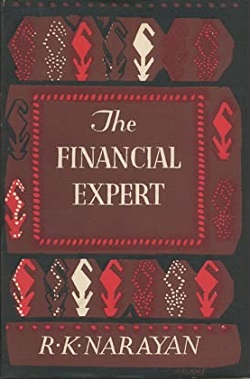
The Financial Expert is a 1952 novel by R. K. Narayan. It takes place, as do many other novels and short stories by this author, in the town of Malgudi. The central character in this book is the financial expert Margayya, who offers advice to his fellow townspeople from under his position at the banyan tree. He is a man of many aspirations and this novel delves into some level of psychological analysis. The Financial Expert tells the story of the rise and fall of Margayya.

The Painter of Signs is a 1976 novel by R. K. Narayan.
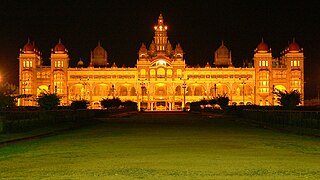
Mysore is a city in the state of Karnataka, India. It is known as the cultural capital of Karnataka. Mysore was the capital of the Wodeyar kings who ruled over the Mysore Kingdom for many centuries. Wodeyars were great patrons of art and music and have contributed significantly to make Mysore a cultural centre. Mysore is well known for its palaces, museums and art galleries and the festivities that take place here during the period of Dasara attract a worldwide audience. Mysore has also lent its name to popular dishes like Mysore Masala Dosa and Mysore Pak. Mysore is also the origin of the popular silk sari known as Mysore silk sari and has also given rise to a popular form of painting known as Mysore painting.
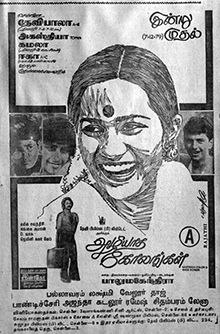
Azhiyatha Kolangal is a 1979 Indian Tamil-language coming-of-age film directed by Balu Mahendra, starring Pratap Pothen and Shoba. Kamal Haasan played a guest role in the film. The film was Balu Mahendra's second directorial venture and his first in Tamil. Partly autobiographical, the film dealt with the events that happen during the adolescence of three friends who live in a small village. In addition to directing the film, Balu Mahendra wrote the screenplay and shot the film. The film is inspired by the 1971 Hollywood film Summer of '42.The film was released on 7 December 1979. Upon release, Azhiyadha Kolangal received critical acclaim, and was premièred at the "Indian Panorama" of the International Film Festival of India in 1980. A spiritual successor, Azhiyatha Kolangal 2, was released in 2019.
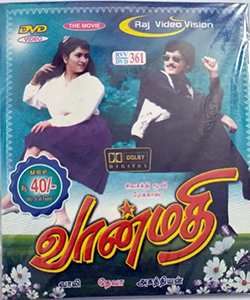
Vaanmathi is a 1996 Indian Tamil-language romantic drama film directed by Agathiyan starring Ajith Kumar and Swathi. This film portrays hatred that slowly transforms to love between two young people who are from very different financial backgrounds. The film was released on 12 January 1996 and went on to become a commercial success.
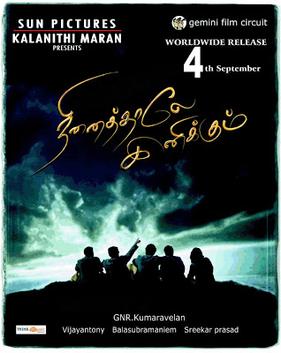
Ninaithale Inikkum is a 2009 Indian Tamil-language drama film directed by G. N. R. Kumaravelan. It is a remake of the 2006 Malayalam film Classmates. Prithviraj Sukumaran reprises his role from the original film, the film co-starred Shakthi Vasu, Priyamani, Karthik Kumar, Anuja Iyer, Vishnupriyan, K. Bhagyaraj and Manobala. The soundtrack was composed by Vijay Antony.
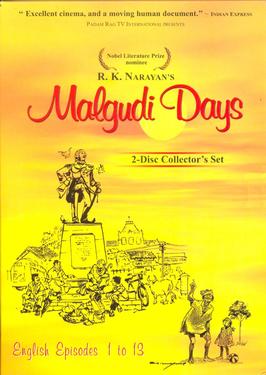
Malgudi Days is an Indian television series that started in 1986, and was filmed in both English and Hindi, based on the 1943 short story collection of the same name by R. K. Narayan. The series was directed by Kannada actor and director Shankar Nag. Carnatic musician L. Vaidyanathan composed the score, while R. K. Narayan's younger brother and acclaimed cartoonist R. K. Laxman was the sketch artist. The series was made by film producer T.S. Narasimhan. In 2006, the series was revived for an additional 15 episodes, which were directed by Kavitha Lankesh.

Malgudi Days is a collection of short stories by R. K. Narayan published in 1943 by Indian Thought Publications.
Banker Margayya is 1983 Indian Kannada-language film directed by T. S. Nagabharana, based on the novel The Financial Expert by R. K. Narayan, and starring Lokesh in the lead role.
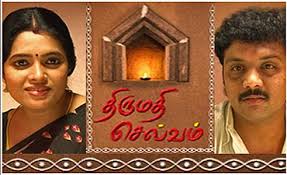
Thirumathi Selvam is a 2007 Tamil television soap opera directed by S. Kumaran and produced by Radhika Srinivasan & B. Srinivasan for Vikatan Televistas. It stars Sanjeev and Abitha in the lead roles with Rindhya, Gautami and Vadivukkarasi played supporting roles. It premiered on 5 November 2007 and initially aired weekday afternoons on Sun TV, before being moved to 8PM on 1 December 2008. The serial ended on 22 March 2013 with 1360 episodes. Thirumathi Selvam is currently re-airing on Kalaignar TV from 29 March 2021.

Drishya (transl. Visual) is a 2014 Indian Kannada-language crime thriller film directed by P. Vasu and produced by E4 Entertainment, starring V. Ravichandran and Navya Nair. It is a remake of the 2013 Malayalam-language film Drishyam, directed by Jeethu Joseph and starring Mohanlal and Meena. The supporting cast feature an ensemble of Achyuth Kumar, Prabhu, Asha Sarath, Swaroopini Narayan, Unnathi and Rohith B. The film's music was composed by Ilaiyaraaja. A sequel Drishya 2 was released in 2021.

















